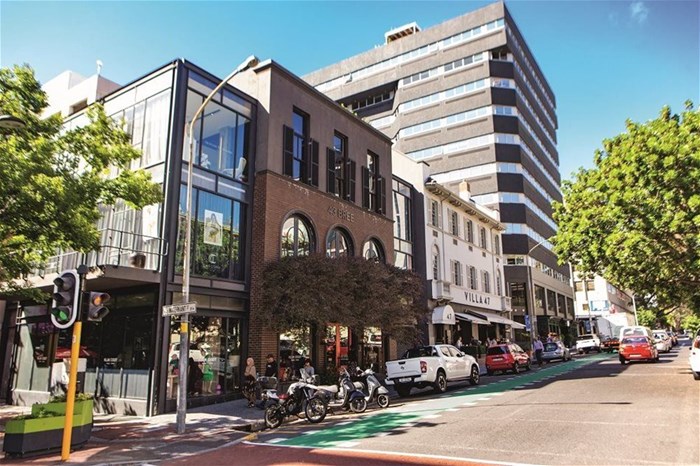The Cape Town CBD's retail economy bounced back strongly in 2022 following challenging times during the pandemic, with the total number of retailers operating in the inner city surpassing pre-Covid-19 levels.

Cape Town CBD Bree Street. Image supplied
This is one of the key findings of the State of Cape Town Central City Report 2022 – A Year in review (SCCR), which was recently launched in the city. The annual report is published by the Cape Town Central City Improvement District (CCID) and provides key indicators of the state of the Central City’s economy, the powerhouse of the greater Cape Town economy, and is a reputed source for national and international property and business investors.
The CCID, a not-for-profit company mandated by property owners to manage an area of 1.6km2 in the inner city, works closely with local and regional government, particularly the City of Cape Town, to ensure that the CBD is safe, clean, welcoming and a place where people want to live, work, do business, and invest.
The value of all property investment into the Cape Town CBD in 2022, conservatively estimated, stood at R3.555bn with 22 development or redevelopments on the cards.
Real economic changes
Rob Kane, CCD chairperson and CEO of Boxwood Property Fund, says while the CBD faced “very real” economic challenges during the pandemic, it has put Covid-19 behind it.
“We have turned the corner, with 2022 and now 2023 ushering in a new dawn for the Cape Town CBD: our economy stabilised and experienced growth, with the City of Cape Town’s 2022 property evaluation estimating the value of all property in the CBD to be R42.9 billion.”
Kane says the report reveals that the retail sector rebounded strongly with the number of businesses increasing from 2,981 in 2021 to 3,116 in 2022.
“Of these 3 116 business entities, retail is the biggest sector, and it grew by 80 businesses, from 1 163 entities in 2021 to 1 243 in 2022. Behind these statistics are resilient, resourceful entrepreneurs who kept the faith, read the changing market, and made strategic business decisions to keep their doors open,” says Kane.
Steady improvement in vacancy rates
Every year, the redevelopment and renovation of commercial buildings in the Cape Town CBD in 2022 ensures that retail space is not constant.
Says CCID CEO Tasso Evangelinos: “In 2022, new retailers opened their doors as footfall and business activity returned to pre-pandemic levels. This led to a steady improvement in retail vacancy rates.”
According to the report, the total volume of retail space available in the four precincts that make up the CCID’s 1.6km2 inner-city footprint amounted to 271,209m2, which is an increase of 0.1 % from the 271,040m2 recorded in 2021.
Of that space, 258,024m2 was occupied in 2022 – an increase of 13,731m2 from the 244,293m2 recorded at the end of 2021, which is an increase of 5.6%. The total vacancy rate of 13,185m2 amounted to just under 5.0% of the total retail space available. In 2021, the total vacancy rate was 9.9%.
Retailers confidence about business conditions
The Cape Town CBD has a broad mix of retailers with destination establishments including award-winning restaurants, bars and coffee shops.
Tasso Evangelinos, CEO of the CCID, says, “We’re pleased to see that retail – one of the largest economies in the Central City – continued its recovery with six more entities in 2022 than in 2019, before the onset of the pandemic.”
According to the CCID’s Business Confidence Index, which the CCID instituted in 2020 to track business confidence levels of beleaguered retailers in the CBD, business confidence started to rebound in the last months of 2021 and continued into 2022 as the pandemic started to abate.
Says Evangelinos: “While just 51 % of the businesses surveyed indicated that they were satisfied with prevailing business conditions in Q4 of 2021, this percentage rose steadily throughout 2022, reaching a level of 83.3 % by year-end.”
Nearly 80 % or the 230 Central City retailers surveyed during Q1 of 2023 indicated they were “satisfied” with current business conditions. “This is a modest deterioration from the final 83.3 % recorded at the end or 2021 but it represents a significant improvement on the 22.9 % of retailers who were ‘satisfied’ with business conditions in mid-2020.”
Evangelinos concludes, “The retail sector has seen strong recovery and we hope to see business confidence continue to climb. This industry is our Central City’s engine room and core to its economy. We salute business owners for their adaptability and resilience and anticipate a robust year of growth and innovation in 2023.”
Retail sectors which experienced the most growth in 2022
1. Health and Beauty, including spas (16 new businesses)
2. Coffee shops and cafes (16 new businesses)
3. Takeaways (7 new businesses)
4. Specialty stores (7 new businesses)
5. Bars and Clubs (6 new businesses)
6. Art galleries (6 new businesses)







































